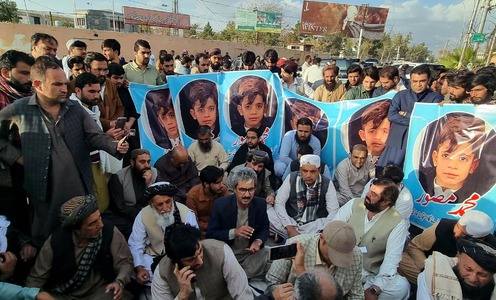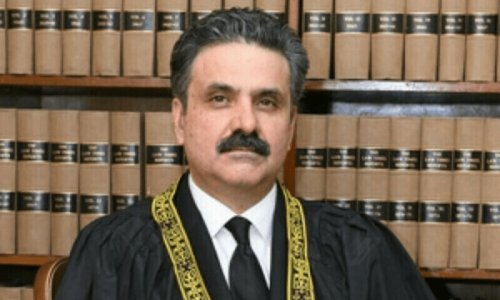PAKISTANI politics has been revolving around slogans — more so today than ever before. The thinking of political leaders whether elected or converts from the military has not penetrated the spring of human needs and aspirations.
This kind of politics places the common man in a dilemma that can be put in no better or simpler words than those of philosopher Bertrand Russell in his Nobel Prize acceptance speech: “If one man offers you democracy and another offers you a bag of grain, at what stage of starvation do you prefer the grain to the vote?
The smooth advent of military men — Ayub Khan, Yahya Khan, Ziaul Haq and Pervez Musharraf — shows that the people repeatedly preferred grain. At today's higher level of starvation and a dysfunctional democracy, their preference for cheap food is unmistakably evident. roti roti,
When Z.A. Bhutto swept Ayub Khan aside, it was more in the hope of , not a socialist order. Mr Bhutto wholly misread the people's mind when he embarked on a ruthless and senseless nationalisation of trade and industry ranging from rural rice hullers to shipping, banking and insurance, and in later years went all out to appease the clerics. Denied the promised the starving multitudes prompted by orthodox elements, dislodged Bhutto at a time when he thought he was at the peak of his political power.
In subsequent coups or elections, parties and leaders — going out or coming in — concerned themselves only with issues of power ignoring the basic needs of the common man and his expectations of a better tomorrow. Blaming history or inheritance is pointless. For reducing once the most promising nation of the region to a violent, impoverished state is the cumulative responsibility of all regimes, civil or military.
Asif Zardari is misreading the situation now the same way the founder of his party did in the 1970s. The chief cause of today's mass discontent is the high price of food at a time when the national granary is overflowing. Nobody is demanding the change of a system that Mr Zardari keeps harping on but lacks the will and means to bring about. All that the common man wants is a job enabling him to buy the grain that is being exported for profit while he starves.
Nothing in the present constitutional arrangement stops Mr Zardari from administering public affairs efficiently and impartially that he should feel persuaded to talk of changing the system. It is hard to imagine what Mr Zardari's government would be able to do after the change which he cannot bring about right away. It is harder still to imagine how his ally Altaf Hussain's 'revolution' would rid Karachi of target killers and land grabbers when the two parties, the MQM and the PPP, with their joint might and resources cannot.
The culprit is their brand of democracy which prevents them from giving the city, and the country, a neutral administration that follows the law and not party interests or directives. No system change, much less a revolution is required — political will is enough to recruit policemen on merit on whom they must rely to control murders, encroachments and extortion.
That they are not inclined to do. Otherwise, just a few months ago, they wouldn't have divided all the police posts between themselves — a fact widely reported but not denied. The same goes for postings all the way from SHO up to IG.
As an official of the last generation, who was closely associated with the law and order and land affairs of Karachi for a number of years at various levels, I have no doubt that if the administration even in its present depleted, hodgepodge state were to be allowed to work under professional command, organised crime and racketeering would stop in a matter of months. A message has just to go out to gangsters and their political patrons.
The chief justice of Pakistan's recent advice to civil servants not to comply with illegal orders is timely and is bound to have some effect. But more effective would be a warning to ministers and legislaters, and through them to their acolytes, that issuing illegal orders will disqualify them from holding public office. Civil servants then shall have to contend only with oral orders emanating from menacing figures in the shadows.
In dealing with illegalities, the protected judges should know better than the vulnerable officials how difficult it is to make politicians comply with even legal orders. The majority of civil servants among them would surely resist illegal and even improper orders if the terms and tenures of senior civil servants, say, joint secretary and the equivalent in all cadres, were to be constitutionally protected the way judges are.
They, in turn, would stand by their subordinates as, indeed, they did until Mr Bhutto summarily dismissed 1,400 of them (including some dead and retired), broke the services into groups and left their careers to the mercy of the political winds.
Before that, when Ayub Khan pitched against the formidable Fatima Jinnah in the presidential contest requiring the political agents and deputy commissioners of the Frontier Regions to caution, nothing more, the tribal maliks against voting for Miss Jinnah, all of them declined. No harm came to them. But all that could have happened was transfer to a distant area. Governor Kalabagh spared them even that ordeal. n
As a constitutionally protected district magistrate I stayed on in Karachi through four turbulent years brooking no interference. As an unprotected chief secretary, I could survive for less than a year while orders poured in every moment of the day. The government then lasted but for another year. But no politician ever learns his lessons. Eight more governments came and fell before Gen Musharraf rode in to public acclaim and judicial approval.
kunwaridris@hotmail.com








































Dear visitor, the comments section is undergoing an overhaul and will return soon.